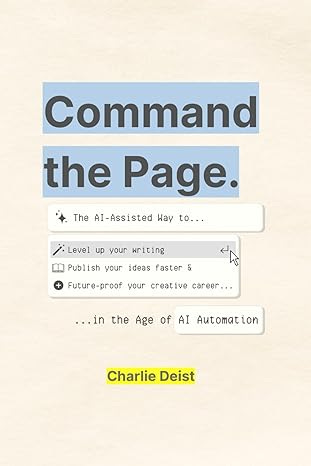In 2016, Tim Ferriss published Tools of Titans – an 800-page monster of a book distilling key lessons from his 100+ podcast interviews with “world-class performers.” Arnold Schwarzenegger wrote the foreword and it became the #1 New York Times bestseller overnight.
The question today: can content creators use AI to replicate Ferriss’s success in transforming audio into best-selling books?
The answer to this question depends on the answer to another question: “Does your content suck?”
If so, then there is no AI wand that will automagically make it awesome.
But if you’re sitting on a mountain of banger audio content accumulated since the B.C. era (Before ChatGPT), you might just be able to produce the next Tools for Titans from the raw “source material” of the transcripts.
And it’s not just podcasts to books.
You can also turn…
Interviews → Features, bios
Screen share videos → Standard Operating Procedures
Zoom recordings → meeting ntoes
Speeches → Op-eds
Improv → Sketch scripts
We’ve talked about how people get hung up on the “generative” part of GPT, forgetting the much more transformative potential for the T.
Generative Pretrained Transformers are made for this.
They make content repurposing faster, easier, and more accessible than ever before.
Future historians will look back at the “transcription revolution” as a key part of the AI Era. AI generated transcripts, further polished and cleaned up by Large Language Models, have lowered the barriers to the point where anyone can do what Tim Ferriss required a small army of human transcription specialists to accomplish: make the spoken word sounds like elegant, articulate prose.
Now, everyone with an audio archive – whether you podcast, give speeches, conduct user research, record lectures, or capture improv sessions – is sitting a wealth of trapped value. Let’s dive in and learn how to free your speech.
“How To Write 3x Faster + Transform Thoughts Into Finished Work.”
YouTube productivity guru August Bradley shared a similar epiphany recently in a newsletter that is worth reading, titled “How To Write 3x Faster + Transform Thoughts Into Finished Work.”
“Writing is thinking,” he writes, echoing a line Charlie himself quoted in his book, Command the Page, from the historian David McCullough, who once wrote, “To write is to think.”
I guess great minds think (and write) alike. Bradley continues:
“It's the process of formulating ideas with specificity. When you struggle to write, it reveals holes in your thinking. When you figure out how to express your thoughts and ideas on paper, it gives structure and organization to the floating concepts in your head. It solidifies, organizes, and clarifies your thinking. So enhancing the flow of the words in written form not only helps overcome the bottleneck of finger typing, but also enhances your thinking.”
Bradley’s “aha” moment came when he realized he could dictate his thoughts faster than he could type, and that it feels like more of a conversaiton and less of a chore.
If you podcast, it is a conversation!
This leads into the all-important question of which Speech to text software to use.
There are dozens of options, and we rely on more than one depending on the use case.
For Zoom meetings, you can use the auto-captions for your recordings (a VTF file).
For podcasts, you can upload to Otter.ai, or get a transcript in editing software like Descript.
Even YouTube and Slack have built in transcription for videos uploaded to their platform.
August recommends a paid tool called AudioPen that automagically refines your spoken brain dump into prose. However, we feel like these tools can be restrictive.
We like to stay in control of the process, to be able to fine-tune results.
Fortunately, there’s an alternative solution that keeps you firmly in the driver’s seat. Here’s how it works.
The Process:
Record audio (podcast, voice memo etc)
Generate transcript
Load into workspace (Notion)
Refine into draft using Improve Writing
Redistribute excerpts
Let’s go through this one step at a time.
Step 1: Record Audio
Whether via podcast, meetings, voice memos, or any other capture method, audio recording allows you to easily externalize the ideas swirling around your mind. Speaking thoughts aloud not only gets them out of your head but also clarifies thinking in the very act of articulation. Plus, it’s often faster and more natural than typing out your stream of consciousness.
At this stage, don’t worry about structure or polish. Just focus on capturing the raw source material. Sources can can range from daily check-ins with employees to testimonials from clients. The key is building up a rich repository to draw from later.
Step 2: Generate Transcript
Feed the raw audio into software leveraging the latest AI speech recognition (ASR) to automatically convert speech to text. Services like Otter, Descript, and Rev utilize neural networks trained on massive datasets to deliver over 98% accuracy. For more challenging audio, like thick accents or poor recording quality, specialized services like AssemblyAI can still produce impressive results thanks to their vast training data.
Step 3: Load Transcript into Workspace
With ideas now captured in tangible text form, import the transcript file into your workspace platform like Notion, Google Docs, or Word.
Step 4: Refine Transcript with AI
Within Notion, you now have the ability to highlight any block of unpolished transcript and select the “Improve Writing” operation to transform your inarticulate ramblings into something more coherent.
Likewise, Grammarly – which works in Word, Google Docs, or anywhere else you type – has copied Notion’s "Improve writing" function. Just highlight a chunk of text, click the little lightbulb icon, and then select “Improve it.”
Pro tip: If you want to make sure the “improved” version isn’t taking too many liberties with your original wording or intact, make sure you compare the AI's suggestions side-by-side with the original transcript. You want to strike a balance between the corrections you want and preserving the speaker's original words and intent.
The “Improve Writing” prompt is just one example of a powerful AI transformation operation that can refine your rough ideas into something of higher value. You can read our thoughts about AI as an engine for content transformation as opposed to content generation here.
#004 - Transform, Don't Generate 💎
A recent Forbes article caught our attention with its clickbait title: 6 Giveaway Signs Of ChatGPT-Generated Content. Among the tells are... Lengthy introductions ("throat clearing") - Rambling opening paragraphs with extraneous backstories or metaphors before getting to the main point
Of course Tim Ferriss's book tool for titans went beyond just polishing up rough transcripts. He focused on the best excerpts and repurposed hour-long transcript into 4-5 page mini-chapters highlighting the most actionable health tips, productivity tools, and life hacks of the “Titans” he had interviewed.
Once you are comfortable transforming rough transcripts into polished prose, there’s just a short learning curve for figuring out how to maximize all kinds of value – from condensed summaries, to podcast show notes, to Standard Operating Procedures.
Watch the full episode to see us turn a check-in with a Virtual Assistant into actionable process document.
So where will YOU start? What hidden gems are waiting to be unearthed from your archives? Whether it's a bestselling book, viral blog post, or game-changing white paper, the raw ingredients are there. All it takes is a small investment of time to learn the simple skills of the Transcript Transformation process outlined above.
Don't let those brilliant ideas and hard-won insights go to waste. Put them to work and start cashing in on the immense trapped value of your spoken words. The Transcript Revolution has arrived - make sure you're not left behind.
Show Notes:
In this episode, we explore the transformative potential of AI-powered transcription and content repurposing. Discover how tools like Otter.ai, Descript, and custom GPT models can help you unlock the value trapped in your audio content. We discuss the "transcription revolution" and its impact on content creation, from turning podcasts into best-selling books to refining rough voice memos into polished prose. We also dive into the controversial New York Times lawsuit against OpenAI and the implications for copyright in the AI era. Finally, we showcase some powerful tools and workflows for transcription and content transformation, including AssemblyAI and our custom Transcript Polisher. Join us as we uncover the secrets to writing faster, thinking better, and maximizing the value of your spoken words.
Links
Write 3x Faster + Transform Thoughts Into Finished Work: https://ckarchive.com/b/0vuwh9hovxwxpf7mggrmzhwqom555
Rabbit r1 mobile device: https://rabbit.tech/
OpenAI Says New York Times Lawsuit Against It Is 'Without Merit': https://www.nytimes.com/2024/01/08/technology/openai-new-york-times-lawsuit.html
Transcription Tools
AssemblyAI - https://www.assemblyai.com/
Otter.ai - https://otter.ai/
Descript - https://www.descript.com/
Transcript Polisher - https://chat.openai.com/g/g-zjBCMv8GA-transcript-polisher
Summary/Tl;dr
00:00 - Introduction: The power of AI in refining and repurposing audio content
03:44 - How transcription tools are transforming businesses and workflows
06:39 - Seeding AI models with unique data to generate valuable insights
10:13 - Rabbit r1 mobile device: A new era of voice-driven interfaces and large action models
16:57 - The New York Times lawsuit against OpenAI and implications for copyright in AI
23:01 - Tools for transcription: AssemblyAI, Otter.ai, Rev, and custom solutions
28:01 - Transcript Polisher: A custom GPT for refining AI-generated transcripts
34:08 - Jobs to be done with AI-powered transcription and content repurposing
38:14 - The future of AI: Predictions and key takeaways for content creators
Keywords: Transcription, content repurposing, AI-powered tools, speech-to-text, AssemblyAI, Otter.ai, Descript, custom GPT, Transcript Polisher, OpenAI lawsuit, copyright, voice interfaces, Rabbit r1, large action models, content creation, podcasts, books, writing


















Share this post